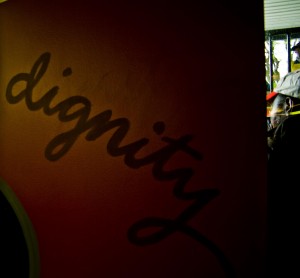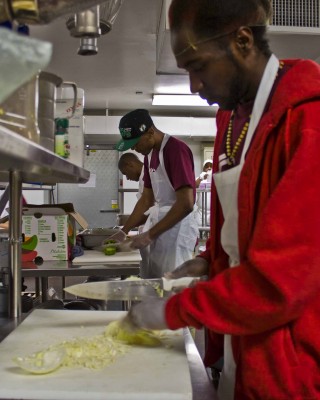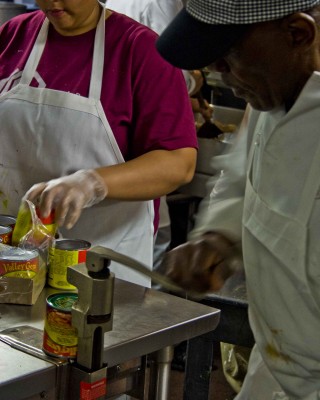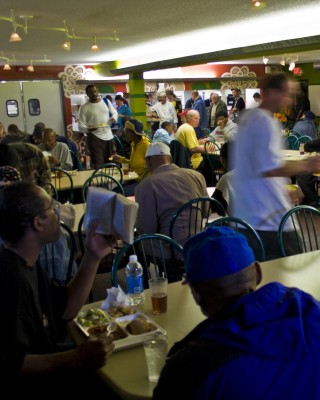ppearances signal a father and a son.
“I want a damn cigarette,” says the elder, Joe.
“You ain’t buying no more, remember,” responds the youth, Kris.
Joe and Kris share no bloodlines, no marriage ties. But “friends” isn’t poignant enough.
“The boy’s my guardian angel,” Joe says.
Kris is 17 and on his own. He dropped out of school so he could earn money patching tires, withstanding the high heat of friers or, lately, mopping spills and stocking produce. A month ago, he moved into an apartment he shares with a roommate. Kris was living in a shelter. That’s where he met Joe, who still lives there. The two try to meet for lunch at Kansas City Community Kitchen a couple days a week.
“As much as I want to think I’m doing it to meet up, it’s a meal I don’t have to pay for,” Kris says. “It ain’t easy living paycheck to paycheck.”
Kris and Joe used to hike together to Kansas City Community Kitchen when it was off Broadway. They endured 25 city blocks of weather featuring every extreme: temperatures so hot they mangled flesh, snow so deep it turns the feet, calves and knees numb. All for one savory meal per day. Since the kitchen’s relocation to 8th and Paseo in September 2010, that two-mile roundtrip is now a few blocks.
In the span of a year, Joe’s longtime girlfriend – “my spirit,” he calls her – passed away from a heart defect, his job as an auto mechanic was terminated and his home was foreclosed. Suddenly, he was on the street, injecting and inhaling whatever he could to deaden the agony. “My heart was torn from my chest, man. Forgot I had a soul.”
Then he found Kris, whom he encountered one day en route to Kansas City Community Kitchen. Kris convinced him to rehabilitate and seek shelter that’s not an underpass.
Joe is looking for employment – “I can take any car apart and put it together better than you’d get from the factory” – and admits to panhandling, a portion of which he is saving to buy a suit and necktie. “I want a bossman to look at me when I sit down for an interview and say: ‘damn.’”
Joe hasn’t had a cigarette in three months. Denying the habit isn’t easy, especially with the pain increasing daily in his lower back. He refuses to consult a doctor. “I don’t want to be a burden to the people,” he says. “They shouldn’t have to foot the bill of my problems.”
Kris won’t allow Joe a cigarette. Nor will he stop pleading that Joe visit a hospital.
“People care about you, man,” Kris says, placing a hand on Joe’s shoulder. “They want you well.”
“There’s a warmth to the place, the people who volunteer there, the people who eat there,” Marie says. “Lots of optimism.”
pportunity brought Marie to Kansas City in June of last year from Panama City, Florida. Her sister had secured a job for her as a receptionist at a not-for-profit. The position was to be full-time at $10 per hour.
The only work Marie could find in Panama City was as a maid. Spring break was great for job security but showings of gratitude by way of tips were slim. Minimum wage to “turn Sodom into the Garden of Eden,” says Marie, a devout Christian.
Marie moved into a one-bedroom apartment in Independence her first week on the job. The single mother of two children (the father is serving jail time for armed robbery), Marie didn’t want to burden her sister any longer.
“I thought the Lord had blessed me with a life of plenty,” she says.
Marie’s minivan is an indicator of her experience in Kansas City. All four hubcaps are missing; the windshield is riddled with cracks; a blown-out rear passenger window is enclosed with duct tape. “The car didn’t look this way when I left Panama City,” she says.
A month into her new job, Marie heard there were to be cutbacks: some would get laid off, others would get reductions in pay or hours. Marie was fortunate enough to fall into the latter category. Her position was now part-time and her pay 50 cents less per hour. She could still make rent and attend to the needs of her children, who are 2 and 4. She couldn’t afford to put three meals on the table every day.
Marie was wary of the stigma associated with “soup kitchens.” She thought Kansas City Community Kitchen would be a gloomy place where freeze dried takes precedence over nutrition. She feared for her children, who might be subjected to the horrors of street life: men and women attuned to violence and addiction. Kansas City Community Kitchen defied expectation.
“There’s a warmth to the place, the people who volunteer there, the people who eat there,” Marie says. “Lots of optimism.”
And the food.
“Mommy, when do we get to eat?” yelps her 4-year-old daughter, Penelope, tugging on her sleeve.
Typically, convincing children to eat their vegetables requires Houdini hijinks or a master of disguise. To mention the word is to conjure rebellion.
No such worry at Kansas City Community Kitchen, where every day fresh veggies are a steamed, seasoned side or incorporated into the main dish.
“Do you like your vegetables, Penelope?” Marie says.
“I do, I do!” she says, twirling like a ballerina.
“I like knowing that my babies can come here, feel comfortable and eat a meal that tastes good and is good for them,” Marie says. “It’s everything to me.”
t’s fitting that Willie lives in a shelter near the street named for Mary Lou Williams, a Kansas City jazz composer, arranger and pianist. “Mmmm, that old gal had rhythm,” he says, shutting his eyes and swaying his head from side to side. “Mary Lou could make a flat foot sharp.” Willie’s voice is raspy, like he’s been gargling shards of glass. Willie was once a well-regarded jazz trumpeter, until a stroke rendered him unable to perform. He says he made good money but the earnings slowed before the stroke. “Nobody has an ear for jazz anymore,” he says. He pawned the trumpet for a couple cartons of cigarettes. “I puffed through those cigs in one night trying to forget what I done.” For Willie, losing his trumpet was like losing an arm or leg. “I’m a cripple without it.”
Willie has one tooth left, an incisor that drapes over his lower lip. The tooth is not among his worries. “When the world ends, this tooth will survive,” he says, seizing the tooth between his fingertips and yanking on it. The tooth holds firm. “I don’t mind eating nothing but mush. At least I’m living and can eat something somewhere.”
Willie is a regular at Kansas City Community Kitchen since its relocation to 8th and Paseo. He likes that the mood of the kitchen is cordial – a product of the springtime designs and colors and inspirational words – such as “dignity” and “love” – that decorate the walls as well as the abundant lighting and a cardinal rule: those who dine there are guests. Willie says he has no family he can claim. “They don’t know nothing about me. Ain’t their fault.” He has a son who recently celebrated his 33rd birthday. “I ain’t proud of the fact I haven’t seen the boy or his momma since he was in elementary school. I went with music over family.”
Homelessness and alienation often go hand in hand. Willie says that not long ago, when he was adrift the streets, he perceived himself as more an alley cat or stray dog than a human being. Willie gestures at one of Kansas City Community Kitchen’s cooks. “The folks in the white caps, they don’t think of me that way. They look me in the eye. And smile.”
Willie says that not long ago, when he was adrift the streets, he perceived himself as more an alley cat or stray dog than a human being.
essa Samson opens the door leading to the Kansas City Community Kitchen, ushering guests inside. “How you been, darling?” a man asks. He is hunched forward, a 90-degree angle fusing his lower back with his hip. “I’m just fine. Yourself?” Samson says. He casts his eyes upward, fixing them on hers. “I’ve been better.” She’ll pray for him, as she prays for all the homeless, the destitute, the forgotten. “They do have nowhere to go, and they do sleep outside.”
Samson knows. She was homeless for about a year. Samson had nowhere to go, no one to call. One afternoon, Samson ate at Kansas City Community Kitchen, where she met someone special, someone who proposed more than a warm meal and a smile. She helped Samson apply for jobs. She’s the reason why Samson works in the bakery department at Wal-Mart. “It’s by the grace of God I met Erika,” Samson says.
Erika Rucker is the head chef and manager of the Kansas City Community Kitchen. She started in October 2010, though she volunteered that September, the month the kitchen opened. Rucker is seldom in her office during the kitchen’s operating hours, which are noon to 2:30 p.m.; she’s either amid the hustle and bustle behind the scenes or a friendly face at the serving line or in the dining area. “I’ve been called everything but a child of God,” Rucker says. Even the guests who arrive drunk or high won’t be denied a meal. “We serve everybody with grace and compassion,” Rucker says. “The customer is always right.”
Rucker is native to Chicago, where she was a banker and bookkeeper for many years until, one day, she was without a job. Late that evening, she was restless, unsure of what career lie ahead. As she dwelled on her future, Rucker noticed something: she was chopping carrots in preparation for a stew. Anxiety always led to cooking, a much-loved hobby. She enrolled at the Le Cordon Bleu College of Culinary Arts, where she attained her culinary arts degree. As a caterer, Rucker had the opportunity to serve 5,000 people at Soldier Field: it prepared her for a career in which she is in charge of feeding 400 to 500 daily. “As a not for profit, you don’t do it for the pay,” Rucker says. “I love having company over to my house for dinner; I don’t see how this is any different.”
The kitchen’s paid staff is small: four cooks and one dish washer. Each day, the kitchen can anticipate 10 to 25 volunteers. “Volunteerism at Kansas City Community Kitchen is a real opportunity to live out the Baptismal Covenant,” Hornbeck says. “You are feeding My sheep. You are feeding My lambs.” Dominick McGinnis volunteers at the kitchen as part of YouthBuild, a family development and learning center with the Housing Authority of Kansas City. “I feel good and upbeat about coming here, like I’m family,” says McGinnis, who recently earned his GED. The experience is more than a good deed: it’s a resume builder.
The menu is set by Rucker and isn’t limited to a protein, starch and vegetable. Accompanying every entrée is fresh fruit, a salad and bread. The menu is characterized by donations. “You have to be flexible,” Rucker says. A surplus of vegetables and fruits during harvest season = a “a fruit and veggie medley.” Thirteen five-gallon barrels of pork ribs = an entrée staple for awhile. Nothing is wasted. If a fruit or vegetable can’t be consumed before its expiration, it’s canned or converted to compost for the same community gardens that yield them (eight churches in our diocese regularly contribute produce from their gardens). “We like to give back to God’s good earth,” says Kenneth Cabean, who was volunteering at Kansas City Community Kitchen when it was “two pots and a skillet in a basement” before its move to Founders’ Hall in 1999.
Near the exit are three sets of used shoes for anybody who might need them. And a basket full of children’s books. Typically, clothing is available as well. “We like to recycle, pass things right along.” A woman grabs hold of a few books and walks toward the exit, where she passes Samson.
Samson bids her the same farewell as everybody else. “Have a good day,” says Samson, who volunteers at the kitchen whenever she has a day off or vacation – “paying it forward,” she calls it.
“Be safe out there.”
If you are interested in volunteering or donating, please contact Episcopal Community Services at 816-561-8920. For more information about additional ministries, visit www.episcopalcommunity.org.




